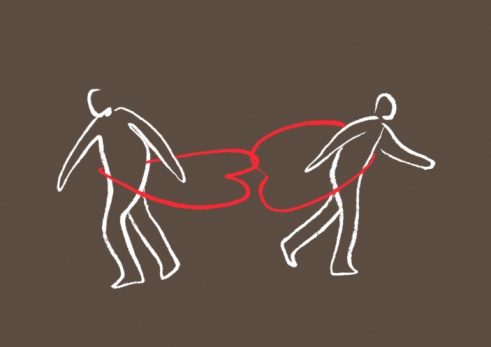
Collaborative Divorce was started in Minnesota 25 years ago and has spread to more than 20 countries because it meets two basic needs felt by divorcing couples around the world. What does it mean to say that a divorce is Collaborative?
First, it is important to understand that difference between the formal Collaborative divorce process (with a capital C) and the use of the word collaborative. To be collaborative simply means to work together and, in that sense, any divorce in which people work together could be described as collaborative, (small c). However, the Collaborative divorce process is something distinctly different.
Most people want to keep their divorce amicable, and Collaborative Divorce gives them the tools to work out of court to make that happen. At the same, people facing divorce want to know that they are protected; that they have someone looking out for their interests. Collaborative Divorce provides each party with an attorney who will work with them to help them achieve their most meaningful goals.
In a Collaborative Divorce, the attorneys must withdraw if the matter goes to court in an adversarial proceedings. That is the one rule. A rule that is simple and yet, changes the entire tenor of the divorce negotiation. It is a great example of addition by subtracting. By subtracting one element, (the ability of the lawyers to fight), a door is opened to add many more valuable tools (true interest based-bargaining, teaming with financial experts and mental health professionals, deeper solutions, etc.). That one change redefines the negotiation and creates a ripple effect that, if handled in a skillful manner, creates many more options.
People sometimes hire aggressive lawyers, reluctantly; believing that their spouse will be aggressive and that they, therefore, need to “fight fire with fire”. The problem, of course, is that fighting fire with fire means there is a great risk that someone (maybe everyone) will get burned.
Collaborative Divorce, with the agreement not to fight, is intended to put out the fire, so that you, and your spouse, can build their future on solid ground. That is not easy to achieve. It requires skill and commitment. An attorney who cannot use argument and fighting must have other skills. Equally important, clients who intend to achieve their highest goals without fighting must be prepared to work on developing other skills as well.
To learn more about the Collaborative Process and to find experts with skill and experience in this area, go to
www.collaborativelaw.org or www.divorcechoice.com.
 In the early days of separation and divorce you may find the idea of growing from your divorce difficult to believe. You may be in a state of depression or denial wondering how your life will carry on, much less that you will grow from this life change. It may be difficult to find the silver lining, yet the simple truth is that you can (and will) grow from this. You may or may not have had much of a choice in whether or not you are getting a divorce, but you DO have a choice whether to grow up or grow down through this process.
In a bad or difficult marriage it is easy to see how a person might grow from getting a divorce, but all divorces bring the opportunity for growth. Your divorce will likely change the way you view the world. Your life may be functioning completely different than before. Maybe you are having to look for a new career or add a part time job to make ends meet, or maybe you’ve been out of the workforce for years and your divorce is forcing you back in. Maybe you’ve had to move to an apartment or back in with your parents or a friend. Maybe your kids are at a new school as a result of your divorce. Maybe your entire social circle has now changed. It’s how you view these changes and react to your new normal, that promotes growth.
Growth from your divorce can appear in a number of ways. Emotionally, spiritually, physically, etc. Even something as simple as learning a new skill that your spouse had always managed like trimming the shrubs, or online bill pay. Spiritually your faith might deepen or may struggle as you get through some trying times. Emotional growth may take a bit longer. There may be some dark and difficult days before you start to grow emotionally, but slowly it will happen. Your priorities will change and grow. If you have shared custody with your children you will likely start to value your time together all that much more. Some things that were priorities during your marriage may no longer hold a significance to you.
Growth after divorce becomes a way to cope. Growth after divorce becomes a way to survive. Growth after divorce becomes empowerment. Growth after divorce becomes a new, better you.
In the early days of separation and divorce you may find the idea of growing from your divorce difficult to believe. You may be in a state of depression or denial wondering how your life will carry on, much less that you will grow from this life change. It may be difficult to find the silver lining, yet the simple truth is that you can (and will) grow from this. You may or may not have had much of a choice in whether or not you are getting a divorce, but you DO have a choice whether to grow up or grow down through this process.
In a bad or difficult marriage it is easy to see how a person might grow from getting a divorce, but all divorces bring the opportunity for growth. Your divorce will likely change the way you view the world. Your life may be functioning completely different than before. Maybe you are having to look for a new career or add a part time job to make ends meet, or maybe you’ve been out of the workforce for years and your divorce is forcing you back in. Maybe you’ve had to move to an apartment or back in with your parents or a friend. Maybe your kids are at a new school as a result of your divorce. Maybe your entire social circle has now changed. It’s how you view these changes and react to your new normal, that promotes growth.
Growth from your divorce can appear in a number of ways. Emotionally, spiritually, physically, etc. Even something as simple as learning a new skill that your spouse had always managed like trimming the shrubs, or online bill pay. Spiritually your faith might deepen or may struggle as you get through some trying times. Emotional growth may take a bit longer. There may be some dark and difficult days before you start to grow emotionally, but slowly it will happen. Your priorities will change and grow. If you have shared custody with your children you will likely start to value your time together all that much more. Some things that were priorities during your marriage may no longer hold a significance to you.
Growth after divorce becomes a way to cope. Growth after divorce becomes a way to survive. Growth after divorce becomes empowerment. Growth after divorce becomes a new, better you.  In the early days of separation and divorce you may find the idea of growing from your divorce difficult to believe. You may be in a state of depression or denial wondering how your life will carry on, much less that you will grow from this life change. It may be difficult to find the silver lining, yet the simple truth is that you can (and will) grow from this. You may or may not have had much of a choice in whether or not you are getting a divorce, but you DO have a choice whether to grow up or grow down through this process.
In a bad or difficult marriage it is easy to see how a person might grow from getting a divorce, but all divorces bring the opportunity for growth. Your divorce will likely change the way you view the world. Your life may be functioning completely different than before. Maybe you are having to look for a new career or add a part time job to make ends meet, or maybe you’ve been out of the workforce for years and your divorce is forcing you back in. Maybe you’ve had to move to an apartment or back in with your parents or a friend. Maybe your kids are at a new school as a result of your divorce. Maybe your entire social circle has now changed. It’s how you view these changes and react to your new normal, that promotes growth.
Growth from your divorce can appear in a number of ways. Emotionally, spiritually, physically, etc. Even something as simple as learning a new skill that your spouse had always managed like trimming the shrubs, or online bill pay. Spiritually your faith might deepen or may struggle as you get through some trying times. Emotional growth may take a bit longer. There may be some dark and difficult days before you start to grow emotionally, but slowly it will happen. Your priorities will change and grow. If you have shared custody with your children you will likely start to value your time together all that much more. Some things that were priorities during your marriage may no longer hold a significance to you.
Growth after divorce becomes a way to cope. Growth after divorce becomes a way to survive. Growth after divorce becomes empowerment. Growth after divorce becomes a new, better you.
In the early days of separation and divorce you may find the idea of growing from your divorce difficult to believe. You may be in a state of depression or denial wondering how your life will carry on, much less that you will grow from this life change. It may be difficult to find the silver lining, yet the simple truth is that you can (and will) grow from this. You may or may not have had much of a choice in whether or not you are getting a divorce, but you DO have a choice whether to grow up or grow down through this process.
In a bad or difficult marriage it is easy to see how a person might grow from getting a divorce, but all divorces bring the opportunity for growth. Your divorce will likely change the way you view the world. Your life may be functioning completely different than before. Maybe you are having to look for a new career or add a part time job to make ends meet, or maybe you’ve been out of the workforce for years and your divorce is forcing you back in. Maybe you’ve had to move to an apartment or back in with your parents or a friend. Maybe your kids are at a new school as a result of your divorce. Maybe your entire social circle has now changed. It’s how you view these changes and react to your new normal, that promotes growth.
Growth from your divorce can appear in a number of ways. Emotionally, spiritually, physically, etc. Even something as simple as learning a new skill that your spouse had always managed like trimming the shrubs, or online bill pay. Spiritually your faith might deepen or may struggle as you get through some trying times. Emotional growth may take a bit longer. There may be some dark and difficult days before you start to grow emotionally, but slowly it will happen. Your priorities will change and grow. If you have shared custody with your children you will likely start to value your time together all that much more. Some things that were priorities during your marriage may no longer hold a significance to you.
Growth after divorce becomes a way to cope. Growth after divorce becomes a way to survive. Growth after divorce becomes empowerment. Growth after divorce becomes a new, better you. 





 Vacations are a common part of family life. Some families like to camp or take close-to-home trips to a local hotel or amusement location. Other families have vacation traditions, such as family reunions or a favorite locales that they visit year after year. And others may like to spend freely and take extravagant vacations.
It is common to be concerned about vacations in divorce. When one, nuclear family becomes a bi-nuclear family with two home bases, it may seem like a foregone conclusion that vacations will need to end. While things certainly need to change, in a
Vacations are a common part of family life. Some families like to camp or take close-to-home trips to a local hotel or amusement location. Other families have vacation traditions, such as family reunions or a favorite locales that they visit year after year. And others may like to spend freely and take extravagant vacations.
It is common to be concerned about vacations in divorce. When one, nuclear family becomes a bi-nuclear family with two home bases, it may seem like a foregone conclusion that vacations will need to end. While things certainly need to change, in a  No one imagines they will find themselves single, divorced, and living in a 4 bedroom house in the suburbs alone, and then it happens. So what do you do when you wake up and realize that your life is not at all what you ever imagined it would be? How do you “cope” and “mourn” the loss of the life you had been planning for yourself?
First, remember you are not alone. You are never alone in this. Lean on your friends, family, and a good support group – whether it’s a support group you created with a network of friends and family, or a more formal divorce support group in your area. There are so many resource out there, find people/places/networks that you feel comfortable with. Seek out professional counseling or therapy, sometimes just talking about these hopes and dreams that could have/should have/would have been to a neutral party can be such a relief.
Know that it is ok to mourn this loss. For you it may be the loss of the “perfect family” you had envisioned – whether you never had kids and always wanted them, or had 1 or 2 and had wanted more. Maybe for someone else who is forced to go back to work because of the divorce, it may be the loss of being able to stay at home with the children. Perhaps it’s the loss of a certain lifestyle one may have gotten used to or thought they would attain someday, whether financially or within a certain social circle. Maybe divorce forced you to move to new area and you are mourning the loss of being close to your friends, in a certain school district for your children, or even simply mourning the loss of your home. It’s not irrational to mourn these things, whether they are lifestyles and material items you no longer have, or were simply hopes for the future – it is ok.
Take comfort in knowing that you never know what the future has in store for you. Maybe you always wanted kids and suddenly find yourself dating someone with children that you simply adore (young or old). Think you’re too old for that reality? Maybe you will remarry and have pile of grandchildren in your future. Maybe having to go back to work will one day lead to a promotion that allows you to take your children on trips of a lifetime and provide for their college education. There is a quote by Joseph Campbell that reads, “We must be willing to let go of the life we had planned, so as to have the life that is waiting for us.” Remember that.
No one imagines they will find themselves single, divorced, and living in a 4 bedroom house in the suburbs alone, and then it happens. So what do you do when you wake up and realize that your life is not at all what you ever imagined it would be? How do you “cope” and “mourn” the loss of the life you had been planning for yourself?
First, remember you are not alone. You are never alone in this. Lean on your friends, family, and a good support group – whether it’s a support group you created with a network of friends and family, or a more formal divorce support group in your area. There are so many resource out there, find people/places/networks that you feel comfortable with. Seek out professional counseling or therapy, sometimes just talking about these hopes and dreams that could have/should have/would have been to a neutral party can be such a relief.
Know that it is ok to mourn this loss. For you it may be the loss of the “perfect family” you had envisioned – whether you never had kids and always wanted them, or had 1 or 2 and had wanted more. Maybe for someone else who is forced to go back to work because of the divorce, it may be the loss of being able to stay at home with the children. Perhaps it’s the loss of a certain lifestyle one may have gotten used to or thought they would attain someday, whether financially or within a certain social circle. Maybe divorce forced you to move to new area and you are mourning the loss of being close to your friends, in a certain school district for your children, or even simply mourning the loss of your home. It’s not irrational to mourn these things, whether they are lifestyles and material items you no longer have, or were simply hopes for the future – it is ok.
Take comfort in knowing that you never know what the future has in store for you. Maybe you always wanted kids and suddenly find yourself dating someone with children that you simply adore (young or old). Think you’re too old for that reality? Maybe you will remarry and have pile of grandchildren in your future. Maybe having to go back to work will one day lead to a promotion that allows you to take your children on trips of a lifetime and provide for their college education. There is a quote by Joseph Campbell that reads, “We must be willing to let go of the life we had planned, so as to have the life that is waiting for us.” Remember that.  Collaborative Divorce was started in Minnesota 25 years ago and has spread to more than 20 countries because it meets two basic needs felt by divorcing couples around the world. What does it mean to say that a divorce is Collaborative?
First, it is important to understand that difference between the formal Collaborative divorce process (with a capital C) and the use of the word collaborative. To be collaborative simply means to work together and, in that sense, any divorce in which people work together could be described as collaborative, (small c). However, the Collaborative divorce process is something distinctly different.
Most people want to keep their divorce amicable, and Collaborative Divorce gives them the tools to work out of court to make that happen. At the same, people facing divorce want to know that they are protected; that they have someone looking out for their interests. Collaborative Divorce provides each party with an attorney who will work with them to help them achieve their most meaningful goals.
In a Collaborative Divorce, the attorneys must withdraw if the matter goes to court in an adversarial proceedings. That is the one rule. A rule that is simple and yet, changes the entire tenor of the divorce negotiation. It is a great example of addition by subtracting. By subtracting one element, (the ability of the lawyers to fight), a door is opened to add many more valuable tools (true interest based-bargaining, teaming with financial experts and mental health professionals, deeper solutions, etc.). That one change redefines the negotiation and creates a ripple effect that, if handled in a skillful manner, creates many more options.
People sometimes hire aggressive lawyers, reluctantly; believing that their spouse will be aggressive and that they, therefore, need to “fight fire with fire”. The problem, of course, is that fighting fire with fire means there is a great risk that someone (maybe everyone) will get burned.
Collaborative Divorce, with the agreement not to fight, is intended to put out the fire, so that you, and your spouse, can build their future on solid ground. That is not easy to achieve. It requires skill and commitment. An attorney who cannot use argument and fighting must have other skills. Equally important, clients who intend to achieve their highest goals without fighting must be prepared to work on developing other skills as well.
To learn more about the Collaborative Process and to find experts with skill and experience in this area, go to
Collaborative Divorce was started in Minnesota 25 years ago and has spread to more than 20 countries because it meets two basic needs felt by divorcing couples around the world. What does it mean to say that a divorce is Collaborative?
First, it is important to understand that difference between the formal Collaborative divorce process (with a capital C) and the use of the word collaborative. To be collaborative simply means to work together and, in that sense, any divorce in which people work together could be described as collaborative, (small c). However, the Collaborative divorce process is something distinctly different.
Most people want to keep their divorce amicable, and Collaborative Divorce gives them the tools to work out of court to make that happen. At the same, people facing divorce want to know that they are protected; that they have someone looking out for their interests. Collaborative Divorce provides each party with an attorney who will work with them to help them achieve their most meaningful goals.
In a Collaborative Divorce, the attorneys must withdraw if the matter goes to court in an adversarial proceedings. That is the one rule. A rule that is simple and yet, changes the entire tenor of the divorce negotiation. It is a great example of addition by subtracting. By subtracting one element, (the ability of the lawyers to fight), a door is opened to add many more valuable tools (true interest based-bargaining, teaming with financial experts and mental health professionals, deeper solutions, etc.). That one change redefines the negotiation and creates a ripple effect that, if handled in a skillful manner, creates many more options.
People sometimes hire aggressive lawyers, reluctantly; believing that their spouse will be aggressive and that they, therefore, need to “fight fire with fire”. The problem, of course, is that fighting fire with fire means there is a great risk that someone (maybe everyone) will get burned.
Collaborative Divorce, with the agreement not to fight, is intended to put out the fire, so that you, and your spouse, can build their future on solid ground. That is not easy to achieve. It requires skill and commitment. An attorney who cannot use argument and fighting must have other skills. Equally important, clients who intend to achieve their highest goals without fighting must be prepared to work on developing other skills as well.
To learn more about the Collaborative Process and to find experts with skill and experience in this area, go to 